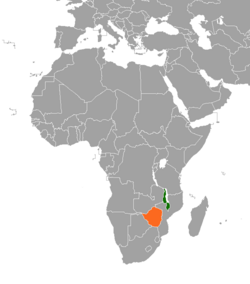
Botswana has put a premium on economic and political integration in southern Africa. It has sought to make the Southern African Development Community (SADC) a working vehicle for economic development, and it has promoted efforts to make the region self-policing in terms of preventive diplomacy, conflict resolution, and good governance. The SADC headquarters are located in Gaborone, the capital of Botswana. It has welcomed post-apartheid South Africa as a partner in these efforts. Botswana joins the African consensus on most major international matters and is a member of international organizations, such as the United Nations and the African Union. Botswana is also a member of the International Criminal Court with a Bilateral Immunity Agreement of protection for the US-military.

Malawi's former President Bakili Muluzi continued the pro-Western foreign policy established by his predecessor, Hastings Banda. It maintains excellent diplomatic relations with principal Western countries. Malawi's close relations with South Africa throughout the apartheid era strained its relations with other African nations. Following the collapse of apartheid in 1994, Malawi developed, and currently maintains, strong diplomatic relations with all African countries.

Southern Africa is the southernmost subregion of the African continent, variably defined by geography or geopolitics, and including between five to twenty countries and territories. The five member states of the Southern African Customs Union (SACU) have always been included in Southern Africa.
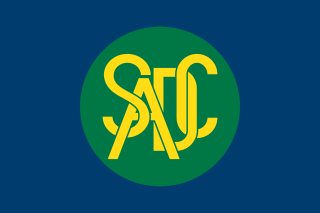
The Southern African Development Community (SADC) is an inter-governmental organization headquartered in Gaborone, Botswana. Its goal is to further regional socio-economic cooperation and integration as well as political and security cooperation among 16 countries in southern Africa.

The Organisation of African, Caribbean and Pacific States (OACPS) is a group of countries in Africa, the Caribbean, and the Pacific that was created by the Georgetown Agreement in 1975. Formerly known as African, Caribbean and Pacific Group of States (ACP), the organisation's main objectives are sustainable development and poverty reduction within its member states, as well as their greater integration into the world's economy. All of the member states, except Cuba, are signatories to the Cotonou Agreement with the European Union.
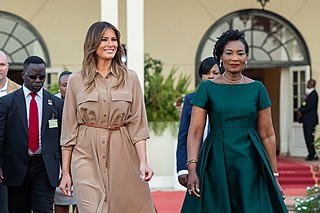
The transition from a one-party state to a multi-party democracy significantly strengthened the already cordial U.S. relationship with Malawi. Significant numbers of Malawians study in the United States. The United States has an active Peace Corps program, Centers for Disease Control and Prevention, Department of Health and Human Servicess, and an Agency for International Development (USAID) mission in Malawi. Both countries have a common history and English language, as they were part of the British Empire.
Zambian President Levy Mwanawasa called an emergency meeting of SADC leaders for 12 April during the 2008 Zimbabwe presidential election to discuss the post-election impasse. According to Mwanawasa, Zimbabwe's "deepening problems" meant that the issue needed to be "dealt with at presidential level". Jacob Zuma, meanwhile, said that he thought results should have already been announced, and he described the failure to release them as "unprecedented".

The African Free Trade Zone (AFTZ) is a free trade zone announced at the EAC-SADC-COMESA Summit on 22 October 2008 by the heads of Southern African Development Community (SADC), the Common Market for Eastern and Southern Africa (COMESA) and the East African Community (EAC). The African Free Trade Zone is also referred to as the African Free Trade Area in some official documents and press releases.

Botswana–South Africa relations refers to the historical and current relationship of Botswana and South Africa. Botswana has a high commission in Pretoria and South Africa has a high commission in Gaborone. Both countries are former British colonies and members of the African Union, the Commonwealth of Nations and the Southern African Development Community (SADC).

Botswana–Namibia relations refers to the current and historical relationship between Botswana and Namibia. As of 2009, relations were considered friendly, with the two neighboring countries cooperating on economic development. Botswana gained independence from Britain in September 1966. Namibia gained independence from South Africa in 1990 following the Namibian War of Independence, and the two countries soon after established formal diplomatic relations. Botswana has a high commission in Windhoek. Namibia has a high commission in Gaborone.
Malawian diaspora refers to Malawian citizens and foreign nationals of Malawian descent who relocate—temporarily or permanently—to foreign countries. There are no reliable figures on how many Malawians live abroad. Populations of Malawians can be found in the Americas, Europe, Africa and Asia. Malawians have historically been an important supply of both skilled and unskilled labor to other countries. Malawians were a source of labor to the diamond and gold mines in Southern Africa, particularly South Africa. Many Malawian health professionals have migrated to the Global North in search of employment. The migration of skilled labor has contributed to the brain drain that is affecting many African nations.
The Zambezi Watercourse Commission (ZAMCOM) is a water management organization established by member states of the Southern African Development Community (SADC) whose territory contains the Zambezi river basin.

Malawi–Mozambique relations refers to the current and historical relationship between the countries of Malawi and Mozambique. As Malawi shares a large border with Mozambique, much of the substance of their foreign relations pertain to the border separating the two nations. Both of the sovereign states have amicably agreed that lacustrine borders on Lake Malawi remain the largest priority between the two countries, as the exploitation of natural resources within the waters of Lake Malawi remain an issue the two countries continue to resolve. The moment considered an act of generosity and sympathy within the two countries relations is when, during the Mozambique Civil War, Malawi housed over one million Mozambican refugees between 1985 and 1995. After this gesture, Malawian relations with Mozambique crumbled under the tenure of Bingu wa Mutharika, notoriously reaching a nadir when Malawian police launched a raid into Mozambique's territory.
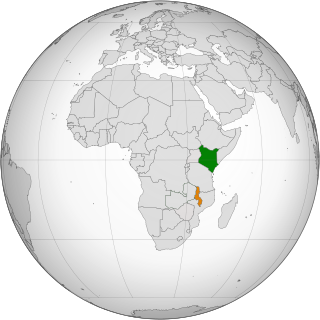
Kenya–Malawi relations are bilateral relations between Kenya and Malawi.

Malawi and Zambia have had a close history for a long time. They share common values, history, language, culture, and border. They were one country, along with Zimbabwe, under the Federation of Rhodesia and Nyasaland. Malawi has a large Zambian diaspora and Zambia has a large Malawian diaspora. Both countries are members of the Commonwealth of Nations.

Malawi and the Kingdom of Morocco have had diplomatic relations since 31 January 2001. This has been in the form of non-resident diplomatic missions. The Malawi Ambassador in Egypt is accredited to the Kingdom of Morocco. Morocco's Ambassador to South Africa is also the Ambassador to Malawi.
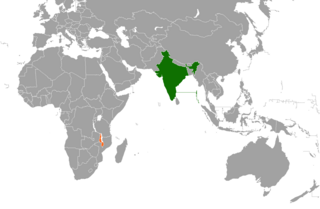
India–Malawi relations refers to the international relations that exist between India and Malawi.
This article examines trends and developments in science and technology in Malawi.
This article examines trends and developments in science and technology in Zimbabwe since 2009.
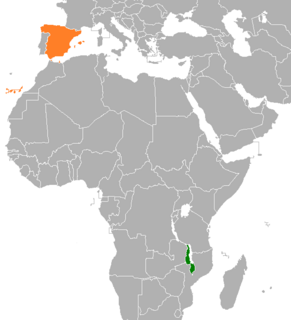
Malawi–Spain relations are the bilateral and diplomatic relations between these two countries. Malawi has an embassy in Madrid and a consulate in Barcelona. The Ministry of Foreign Affairs of Spain does not have representation in Lilongwe. The Spanish Embassy in Harare (Zimbabwe) is accredited to Malawi.
